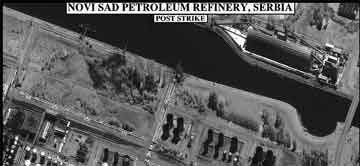Before the rise of Milosevic in Yugoslavia, the province of Kosovo, primarily populated by Muslim ethnic Albanians, had been granted extensive autonomy. Milosevic rescinded that autonomy, resulting in growing resentment of Serbian control. This situation led to the rise of the KLA, a group dedicated to Kosovo's independence. To avoid the slaughter that had occurred in Bosnia, NATO became actively involved in negotiating a peace settlement between the KLA and the Serbs. An agreement was reached between the KLA and the Serbs, which was accepted by the KLA but rejected by the Yugoslav government. NATO demanded that the Serbs accept the agreement, and when they refused, NATO initiated a bombing campaign that lasted 79 days. During the campaign, the Serbs engaged in an active campaign of ethnic cleansing in Kosovo, killing at least 10,000 ethnic Albanians. The bombing campaign, in which the US lost only two planes and no pilots, achieved its goal, and the Serbs withdrew from Kosovo to be replaced by NATO peacekeeping forces..
The roots of the Kosovo War can be traced back to centuries of ethnic and religious animosity between the region's two primary groups: the predominantly Orthodox Christian Serbs and the mainly Muslim ethnic Albanians. After the disintegration of the Ottoman Empire, the Balkan region was fraught with political instability, and this climate of tension continued throughout the 20th century. Following the breakup of the Socialist Federal Republic of Yugoslavia in the early 1990s, Serbia and Montenegro remained in a federation called the Federal Republic of Yugoslavia, with Kosovo as an autonomous province within Serbia.
In the 1990s, the Serbian government, led by President Slobodan Milošević, began a process of political centralization, revoking Kosovo's autonomy and systematically repressing the region's ethnic Albanian majority. This repression triggered the rise of the Kosovo Liberation Army (KLA), an armed group that sought independence for Kosovo from the Federal Republic of Yugoslavia.
Escalation of the Conflict
In 1998, the KLA launched a series of attacks against Serbian police and military installations, leading to a violent crackdown by the Yugoslav government. As the conflict escalated, the KLA gained strength and support from the ethnic Albanian population, which in turn prompted further retaliation from the Yugoslav forces. This cycle of violence led to widespread human rights abuses on both sides, with civilians caught in the crossfire. The conflict was characterized by the forced displacement of hundreds of thousands of ethnic Albanians, as well as numerous cases of extrajudicial killings, sexual violence, and destruction of cultural heritage sites.
International Involvement and the NATO Intervention
The growing humanitarian crisis in Kosovo caught the attention of the international community. Concerned by the potential for the conflict to spill over into neighboring countries, the United Nations Security Council passed Resolution 1199 in September 1998, calling for an end to hostilities and the return of refugees. However, negotiations between the Yugoslav government and the KLA failed to achieve a lasting ceasefire. As a result, in March 1999, NATO launched Operation Allied Force, a 78-day bombing campaign against Yugoslav military targets.
NATO's intervention was controversial, with critics arguing that the alliance lacked a clear mandate under international law and that the bombing campaign caused civilian casualties and destruction of infrastructure. Nevertheless, in June 1999, the Yugoslav government agreed to withdraw its forces from Kosovo, and the conflict effectively ended.
Aftermath and Legacy
The end of the war did not immediately resolve the political status of Kosovo. The province remained under United Nations administration until 2008 when it unilaterally declared independence from Serbia, a move that has been recognized by over 100 countries but remains disputed by Serbia and its allies. In the years following the conflict, many individuals responsible for war crimes, including Slobodan Milošević, were indicted by the International Criminal Tribunal for the former Yugoslavia (ICTY), which helped to establish a measure of accountability for the atrocities committed during the war.
 >
>